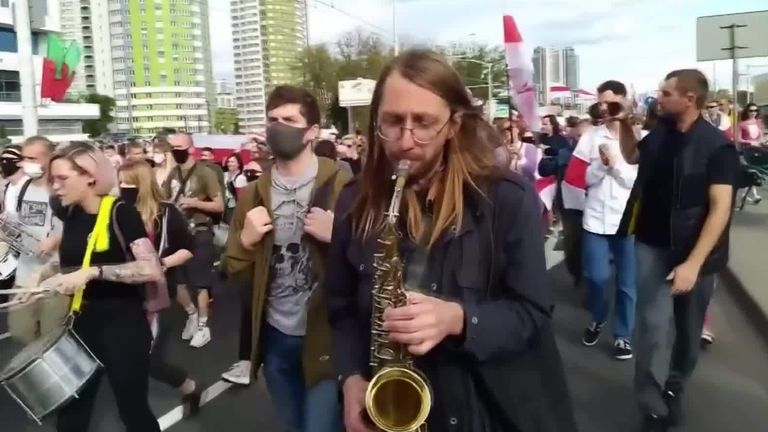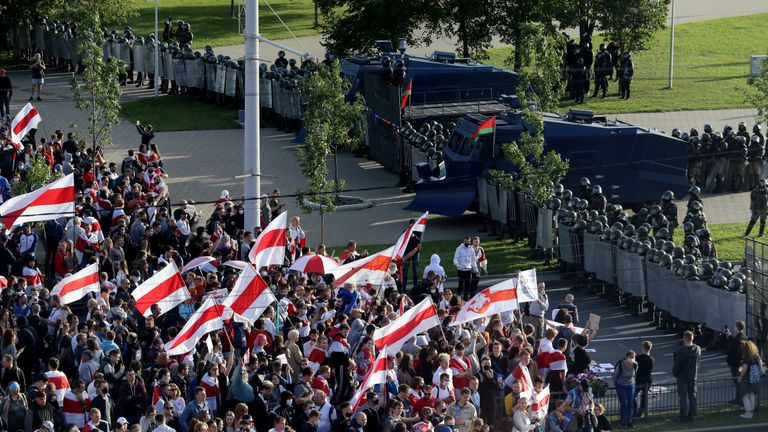What happens next in Belarus won't be up to the protesters - the Kremlin can see to that
Russian President Vladimir Putin looks a likely kingmaker in determining what happens next in Belarus, writes Sky's Diana Magnay.
Monday 14 September 2020 20:00, UK
Courage and wishful thinking won鈥檛 get the protesters of Belarus what they want, at least not any time soon.
They represent all that is decent, honest and brave about a people fed up with a dictator, fending off his vicious security apparatus with not much more than flowers, flags and locked elbows, determined to let the world know that the abuses of civil liberties and human rights which they have known for decades - but which is gathering steam in the wake of August's disputed election - have gone far enough.
Unfortunately for them, brute force and the Kremlin's backing might just be sufficient to see President Lukashenko through this current crisis.
Look at Venezuela. President Nicolas Maduro's days seemed numbered not all that long ago and yet he clings to power, his security apparatus and the military still backing him with the country in far more precarious a situation economically than Belarus is now.
To the recent promise of security assistance should it come to that, Vladimir Putin has now added financial support, announcing in Sochi that Russia will provide Lukashenko with a $1.5bn (£1.15bn) loan.
That should keep the Belarusian leader solvent at least for the next few months and presumably allow him to keep on paying the salaries of his security henchmen, who till now have remained almost uniformly loyal.
"Dear Russians! Your taxes will pay for our beatings! We are sure you don't want that," was opposition leader Svetlana Tikhanovskaya's trenchant response to the news of the loan.
Sometimes body language can speak a thousand words. From Lukashenko's deferential posture in the two leaders' opening remarks, he might as well have come begging bowl in hand.
Vladimir Putin sat legs spread, rocking back and forth on his heels, a seated swagger if ever there was one.
Lukashenko has prided himself in the past on standing up to the Kremlin on questions of Belarusian sovereignty. He does not have that luxury now.
The two men have always had a fractious relationship and Vladimir Putin is also looking to a future without Lukashenko.
"To stabilise Lukashenko's rule is just step one," says Fyodor Lukyanov, editor-in-chief of the Russia In Global Affairs magazine.
"Step two is to find ways to get rid of him - not in a revolutionary way but in an evolutionary one. I don't believe that anybody in Moscow expects him to stay in power for any significant period."
This moment represents an opportunity for the Kremlin to begin making good on Putin's long-held aspirations for closer integration between the two countries.
:: Subscribe to the Daily podcast on , , ,
The European Union has opted for a policy of extreme caution vis-a-vis Belarus.
Despite talk, they have still not announced sanctions against Belarusian officials suspected of egregious human rights abuses. It seems to be taken as read that Russia will be kingmaker on what happens next.
"If you look, the circumstances are uniquely favourable for Russia," says Maksim Samorukov, an analyst with the Carnegie Moscow Centre.
"The United States is paralysed with the last month of Trump's term, the EU is divided, Lukashenko himself is discredited, the Belarusian opposition is very weak and disorganised.
"So it's actually up to the Kremlin to decide how the Belarusian crisis will end. Putin for 20 years has been pushing for greater integration with Belarus and now he has this opportunity to act."
Of course, President Putin will say that it is up to the Belarusian people to resolve their domestic issues themselves.
Interfering in the sovereign affairs of other countries is something the Kremlin always solemnly insists it would never dream of doing.
But it has its eye on the prize and a strategy for getting there, Samorukov says, adding: "Russia will want to play the Belarusian elite against each other in order to deprive Lukashenko of his monopoly on Belarusian politics.
"It doesn't want to annex the country altogether. But it would like to control its foreign and security policy, while outsourcing any domestic issues to the Belarusian elite."








